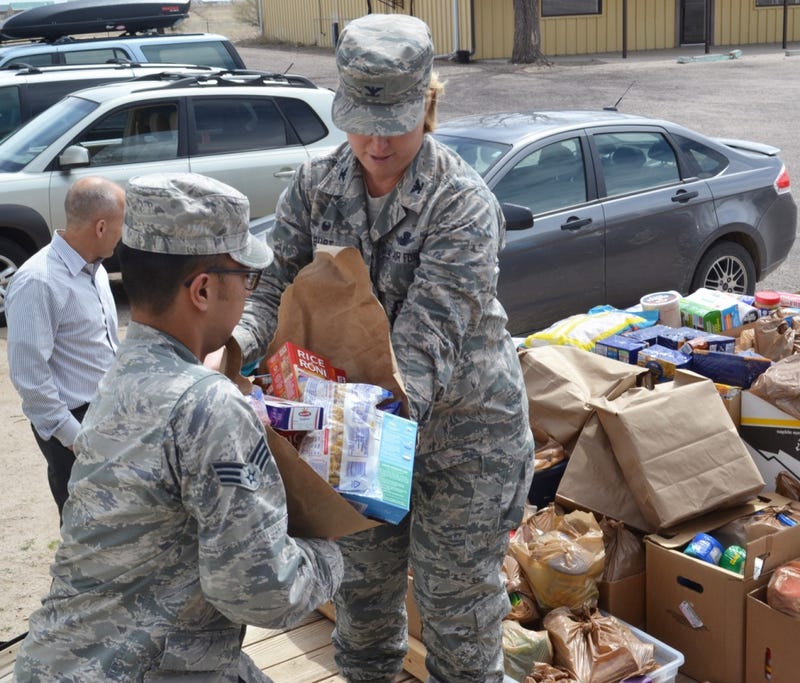
Thousands of military families across the country struggle with food insecurity and don't always qualify for help. Capitol Hill lawmakers are now renewing an effort to help struggling lower-income troops feed their families.
"People don't understand and don't know this is an issue," Army veteran Sen. Tammy Duckworth, D-Illinois, said in an interview Thursday. "When I tell people there are military families on SNAP benefits, people look at me incredulously ... How is it that we could be in a place where somebody who is actively serving in our military doesn't have enough food to feed themselves and their family members."
When the military is unable to provide housing for service members and their families depending on where they are stationed, those troops receive a basic housing allowance (BAH) stipend to pay for off-base or privatized military housing. But because of how qualifications are calculated for federal food assistance programs such as the Supplemental Nutrition Assistance Program (SNAP), commonly referred to as food stamps, many lower-income military families can be excluded if they receive BAH funds. This inconsistency drives some of those families to rely on food pantries and food banks for emergency help.
Duckworth said her work with food insecurity and food pantries led her to connect with military families, some she knew personally, who struggled with hunger.
"I said, 'Wait a minute, what is going on here?'" Duckworth said, adding that food pantries and other organizations told her that many of the military families they serve can't sign up for food stamps because it's one of the only programs that takes those housing funds into account. She said that's what the Military Hunger Prevention Act aims to address by creating a basic needs allowance for low-income troops. The bill would require the U.S. Department of Agriculture to calculate whether a service member is eligible based on their base pay rather than the basic housing allowance.
“Long before the pandemic, military families struggled to put food on the table. From frequent moves to high rates of military spouse unemployment, the unique challenges of military life left too many families with empty cupboards and empty stomachs," said Besa Pinchotti, acting executive director of the National Military Family Association. "In the last year, those problems have only gotten worse."
In 2020, a Blue Star Families survey found that roughly 14% of enlisted active-duty families who responded reported low or very low food security over the past year.
"This is an unacceptable reality that has dire implications for mission readiness," said Kathy Roth-Douquet, CEO and cofounder of Blue Star Families. "Service members preoccupied with financial and food security concerns are less able to focus on their mission."
Duckworth has introduced similar legislation for years, she said, but she's hopeful this could be the year the bill moves forward.
"I think it's one of those things that's slowly gaining momentum," Duckworth said, adding that there hasn't always been a vehicle to carry the bill, such as a larger agriculture legislation package -- which is often how food insecurity bills move forward. Duckworth is joined by her cosponsor Sen. Marsha Blackburn, R-Tennessee, which Duckworth said she hopes signals wider bipartisan support. A companion bill has also been introduced in the House by Reps. Jimmy Panetta, D-California, and Don Young, R-Alaska.
Duckworth said she's also struggled with hunger and needed food insecurity services, so she understands how critical addressing the inconsistency with the SNAP program is for military families.
"As someone whose family relied on these nutrition programs after my father lost his job, and who served in the uniform for most of my adult life, I’m proud to be working across the aisle with Senator Blackburn on this bill to help make sure our service members and their families have enough to eat," she said.
In June 2020, Duckworth and Blackburn sent a letter to U.S. Secretary of Agriculture Sonny Perdue requesting that the USDA end its practice of considering BAH funds as earned income for military families. Duckworth also sent a letter to President Joe Biden earlier this year urging the White House to develop steps to tackle what she called an "alarming rate" of food insecurity among military families.
"We will keep fighting for our service members and their families as long as it takes," Blackburn said. "The last thing our servicemen and women should be concerned with is putting food on the table for their loved ones."
But the conversation shouldn't stop at food insecurity, Duckworth insisted.
"The design of military compensation, especially at the lower and junior enlisted levels, assumes for a military that doesn't exist anymore -- a military from maybe 40 years ago when most of those folks were single," she said. "Now, a huge percentage of our military force are married with children. The pay scales have not been adjusted to reflect our military as it stands today in the 21st century."
Duckworth said she expects White House support should the bill make it through Congress this session.
"Don't forget that the Bidens are a military family and they understand the struggles of military families," she said.
—
Reach Abbie Bennett: abbie@connectingvets.com or @AbbieRBennett.
Sign up for the Connecting Vets weekly newsletter to get more stories like this delivered to your inbox.




